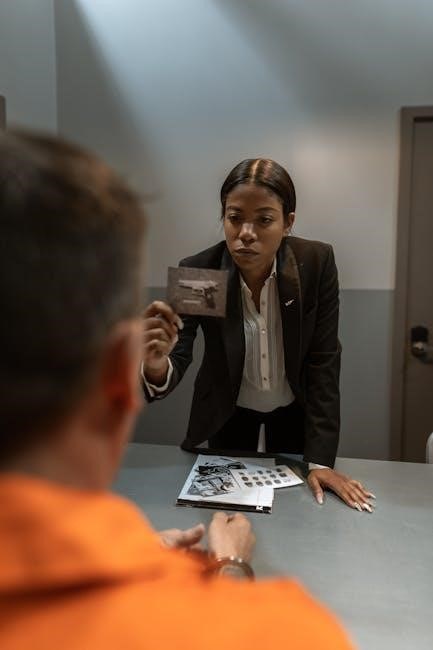
f1 visa interview questions and answers pdf
This guide provides a comprehensive overview of F1 visa interview questions, offering detailed answers and tips to help students prepare effectively for their interviews. It covers common topics such as study plans, university choices, financial stability, and post-graduation goals, ensuring applicants are well-equipped for a successful outcome. The PDF serves as an essential resource for understanding the interview process and increasing confidence.
Overview of the F1 Visa Process
The F1 visa process is designed for international students seeking to pursue academic studies in the United States. It involves submitting necessary documents, such as admission letters and financial proofs, and attending a visa interview. The process evaluates applicants’ academic intentions, financial stability, and ties to their home country. Preparation for the interview is crucial, as it assesses the student’s genuine purpose and plans. Understanding the process helps applicants navigate the requirements efficiently and increase their chances of approval.
Importance of Preparing for the Interview
Preparing for the F1 visa interview is essential to demonstrate eligibility and clear intentions. A well-prepared applicant can confidently address questions about academic goals, university choice, and financial plans. This preparation increases the likelihood of approval. It also ensures the applicant can articulate their study plans and post-graduation intentions effectively. Additionally, familiarity with common questions helps reduce anxiety and showcases genuine interest in studying in the U.S. Proper preparation not only highlights the applicant’s readiness but also aligns with the visa officer’s expectations for a successful interview.
Structure of the F1 Visa Interview Questions and Answers PDF
The PDF is organized into clear sections, starting with an introduction to the F1 visa process. It then outlines common types of interview questions, such as study plans, university choice, and financial status; The guide provides detailed answers to each question, ensuring applicants understand how to articulate their responses effectively. Additionally, it includes tips for a successful interview and common mistakes to avoid. Real-life examples and additional resources are also featured, offering a holistic approach to preparation. This structured format makes it easy for applicants to navigate and prepare thoroughly for their interviews.

Common Types of F1 Visa Interview Questions
Questions focus on study plans, university choices, financial stability, and post-graduation intentions, ensuring applicants demonstrate clear goals and genuine intent to study in the U.S.
Study Plans and Academic Goals
Be prepared to discuss your academic objectives, such as why you chose your specific program, how it aligns with your career aspirations, and what courses interest you most. Highlight any research or practical experiences that influenced your decision. Clearly outline your short-term and long-term goals, demonstrating how studying in the U.S. will help achieve them. Show a well-thought-out plan, including how you intend to utilize the knowledge and skills gained after graduation. This shows commitment and focus to the visa officer.
Choice of University and Program
Be ready to explain why you selected your specific university and program. Highlight the institution’s academic strengths, such as renowned faculty, research opportunities, or specialized courses. Discuss how the program aligns with your career goals and personal interests. Mention any unique features, like internships, laboratories, or networking opportunities, that attracted you. Show that you’ve done your homework by referencing specific details about the program. This demonstrates genuine interest and a clear vision for your academic and professional future, which visa officers appreciate.
Financial Situation and Sponsorship
Questions about your financial situation are crucial to demonstrate your ability to support yourself in the U.S. Be prepared to explain your funding sources, such as scholarships, family support, or personal savings. Provide detailed documents like bank statements, affidavits of support, or sponsorship letters. Clearly articulate how these funds will cover tuition, living expenses, and other costs. Transparency and consistency in your answers are key to showing financial stability and compliance with visa requirements. This ensures the visa officer that you can afford your education without relying on unauthorized employment.
Post-Graduation Plans and Intentions
Be prepared to discuss your plans after completing your studies. Clearly explain how your education aligns with your future goals, such as returning to your home country to work or pursue further opportunities. Highlight specific career plans, how your degree will benefit your home country, or any intentions to contribute to your field. Demonstrating strong ties to your home country and a clear vision for your future can positively impact your visa approval. Avoid vague answers; instead, provide concrete examples of your post-graduation intentions.

Preparing for the F1 Visa Interview
Thorough preparation is key to a successful F1 visa interview. Research your university, understand financial requirements, and practice answering common questions to build confidence and clarity.
Researching the University and Program
Understanding the curriculum, faculty expertise, and research opportunities at your chosen university is crucial. Demonstrating knowledge about the program’s alignment with your academic and career goals shows genuine interest. Additionally, familiarizing yourself with the university’s location, campus culture, and student services highlights your commitment to making an informed decision. This preparation not only strengthens your application but also helps you confidently address visa interview questions about your choices and aspirations.
Understanding Financial Requirements
Understanding your financial requirements is critical for the F1 visa interview. You must demonstrate transparency about your funding sources, such as scholarships, family support, or personal savings. Providing detailed documentation, like bank statements and sponsorship letters, ensures credibility. Consistency in the information you present is key to avoiding discrepancies. This preparation not only addresses financial stability but also highlights your commitment to completing your studies without relying on unauthorized employment. A clear understanding of your financial situation helps you confidently answer visa interview questions about your ability to cover tuition and living expenses.
Practicing Common Interview Questions
Practicing common F1 visa interview questions is essential to build confidence and reduce anxiety. Review frequently asked questions, such as why you chose your university, your study plans, and how you will fund your education. Mock interviews with friends or mentors can help you refine your responses. Focus on being clear, concise, and specific in your answers. Understanding the reasoning behind each question, such as demonstrating ties to your home country, will help you address them effectively. Regular practice ensures you are well-prepared to articulate your goals and intentions persuasively during the actual interview.

Top F1 Visa Interview Questions and Answers
This section highlights the most frequently asked F1 visa interview questions, such as reasons for studying in the U.S., funding sources, and post-graduation plans, with concise answers to ensure clarity and confidence during the interview process.
Why Do You Want to Study in the United States?
This question assesses your motivation and understanding of U.S. education. Highlight the quality of education, research opportunities, and diverse cultural exposure. Mention specific programs or professors at your chosen university. Emphasize how studying in the U.S. aligns with your academic and career goals. Be honest about your aspirations and how the U.S. educational system can help you achieve them. Avoid generic answers and provide personal reasons, such as the desire to learn from renowned faculty or access cutting-edge resources. Show enthusiasm for the opportunities the U.S. offers for personal and professional growth.
How Will You Fund Your Education?
Be prepared to explain your financial plan clearly. Discuss sources like scholarships, family support, personal savings, or assistantships. Mention specific amounts and provide documentation, such as bank statements or award letters. Highlight your understanding of living expenses and tuition fees. If relying on family, explain their financial stability. Avoid vague answers and ensure consistency with the information on your I-20 form. Demonstrating a clear, realistic funding plan shows you are prepared to manage your expenses without violating visa terms. Transparency is key to building trust with the visa officer.
What Are Your Plans After Graduation?
Clearly articulate your post-graduation goals, such as returning to your home country to work, pursuing further education, or starting a business. Highlight how your studies in the U.S. will equip you with skills to contribute to your home country. Mention specific career plans or opportunities you plan to explore. Avoid vague statements and ensure your plans align with your field of study. Demonstrating strong ties to your home country and a clear vision for your future will strengthen your case for visa approval and show your intention to return after completing your studies.

Tips for a Successful F1 Visa Interview
Be honest, demonstrate clear ties to your home country, and show genuine enthusiasm for your studies. Proper preparation and confidence will significantly improve your chances of approval.
Being Honest and Transparent
Honesty is crucial during the F1 visa interview. Applicants must provide accurate information about their academic background, financial situation, and future plans. Any discrepancies or false statements can lead to rejection or future visa complications. Being transparent demonstrates integrity and builds trust with the visa officer. Avoid exaggerating qualifications or providing fake documents, as these actions can result in severe consequences. Always ensure documents are genuine and be prepared to discuss any gaps in education or employment openly. Transparency not only aids in approval but also reflects respect for the visa process.
Demonstrating Ties to Your Home Country
Showing strong ties to your home country is essential to assure the visa officer of your intent to return after completing your studies. Examples include family ties, employment opportunities, or property ownership. Highlighting personal or professional commitments, such as a job offer upon graduation or family responsibilities, can strengthen your case. Be specific and provide evidence, such as letters from employers or documents proving ownership. Demonstrating these connections helps establish your intent to return, which is a key factor in visa approval. Honest and clear explanations are vital to avoid doubts about your intentions.

Showing Enthusiasm and Preparation
Displaying genuine enthusiasm for your program and preparation for the interview significantly impacts the visa officer’s perception. Research the university, its curriculum, and faculty to demonstrate your genuine interest. Practice answering common questions confidently and concisely, showcasing your knowledge and excitement about the opportunity. Avoid appearing overconfident but ensure your passion for studying in the U.S. is evident. Preparation also includes organizing required documents and having thoughtful questions ready to ask the officer. This enthusiasm highlights your commitment and readiness for the experience, making a positive impression during the interview.

Common Mistakes to Avoid During the Interview
Common mistakes include dressing inappropriately, failing to bring necessary documents, speaking negatively about your home country, and revealing strong ties that suggest intent to overstay.
Providing Inconsistent Information
One of the most critical mistakes during an F1 visa interview is providing inconsistent information. This can occur when your responses contradict the details in your documents or previous statements. For example, if you mention different academic or financial details during the interview than what is stated in your I-20 or bank statements, it raises concerns about your credibility. Consistency is key to demonstrating authenticity and genuine intent. Always review your documents thoroughly and ensure your answers align with the information provided. Inconsistent information can lead to rejection, as it may suggest a lack of transparency or misleading intentions.
Lack of Knowledge About the Program
Lack of knowledge about your chosen program is a common pitfall during F1 visa interviews. If you cannot provide detailed information about your course, such as its duration, coursework, or why you selected it, it may appear that you are unprepared or unserious about your studies. This can raise concerns about your genuine intentions to study in the U.S. Visa officers expect you to demonstrate a clear understanding of your program and how it aligns with your academic or career goals. Researching thoroughly and being able to articulate this knowledge is crucial for a successful interview.
Appearing Overconfident or Unprepared
Appearing overconfident or unprepared during the F1 visa interview can negatively impact your chances of approval. Overconfidence may lead to sounding dismissive or unappreciative, while being unprepared suggests a lack of seriousness about your studies. Both extremes can raise doubts about your genuine intentions. It is essential to strike a balance by being confident yet humble, showing genuine enthusiasm for your program, and demonstrating thorough preparation. Avoid memorized answers; instead, articulate your thoughts naturally to convey sincerity and readiness for the opportunity to study in the U.S.

Real-Life Examples of F1 Visa Interviews

Real-life examples of F1 visa interviews reveal how applicants succeeded or failed. Approved cases show strong ties to home countries and clear study plans. Rejected cases often lacked sufficient proof of financial support or demonstrated intent to stay in the U.S. These examples provide valuable insights for preparation.
Approved Cases and Their Key Factors
Approved F1 visa cases often highlight well-prepared applicants who clearly articulated their study plans, financial stability, and strong ties to their home country. For instance, a student with a detailed academic roadmap, proof of sufficient funds, and a compelling post-graduation plan demonstrating intent to return home was approved. Another case involved a candidate who provided consistent documentation and confidently answered questions about their program and future goals. These examples emphasize the importance of transparency, thorough preparation, and alignment with visa requirements.
Rejected Cases and Lessons Learned
Some F1 visa applications are rejected due to inconsistencies in documentation or a lack of clear ties to the home country. For example, a candidate who mentioned having a spouse in the U.S. raised concerns about their intent to return home. Another case involved a student whose technical expertise impressed the officer but failed to provide sufficient proof of financial stability. These rejections highlight the importance of transparency, consistency, and demonstrating strong ties to one’s home country. Proper preparation and aligning answers with visa requirements can help avoid such outcomes.

Additional Resources for F1 Visa Preparation
Access top-rated PDF guides, websites, and practice videos to effectively prepare for your F1 visa interview. Utilize mock interviews and expert tips to ensure success.
Recommended PDF Guides and Websites
Several reliable PDF guides and websites offer comprehensive preparation materials for F1 visa interviews. Top resources include the “Top 70 F1 Visa Interview Questions and Answers PDF,” which covers a wide range of topics. Websites like Mindqjobs.com provide free downloadable guides and sample questions. Additionally, platforms offering practice videos and mock interviews simulate real-life scenarios, helping applicants build confidence. These resources are essential for understanding common questions, improving answers, and mastering interview techniques to secure visa approval. Utilize these tools to ensure thorough preparation and a successful outcome.
Practice Videos and Mock Interviews
Practice videos and mock interviews are invaluable tools for F1 visa preparation. Many YouTube channels offer detailed videos sharing top interview questions and answers. For example, channels like “Visa Interview Preparation” provide insights into common queries and how to respond confidently. Mock interviews simulate real-life scenarios, helping applicants refine their responses and body language. These resources allow students to practice answering tough questions, understand interview dynamics, and build confidence. Utilizing these tools ensures applicants are well-prepared and can present themselves effectively during their actual F1 visa interview, increasing their chances of success.